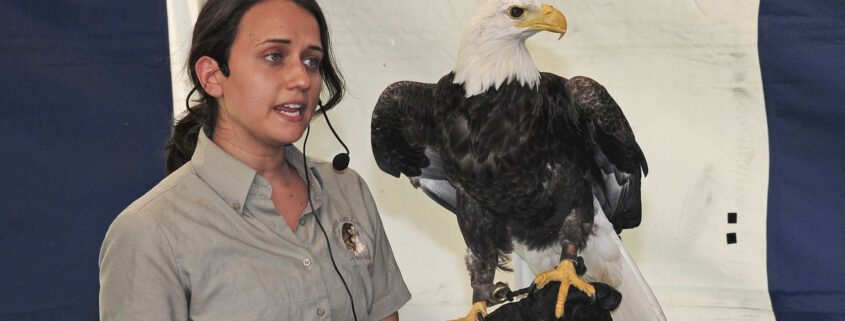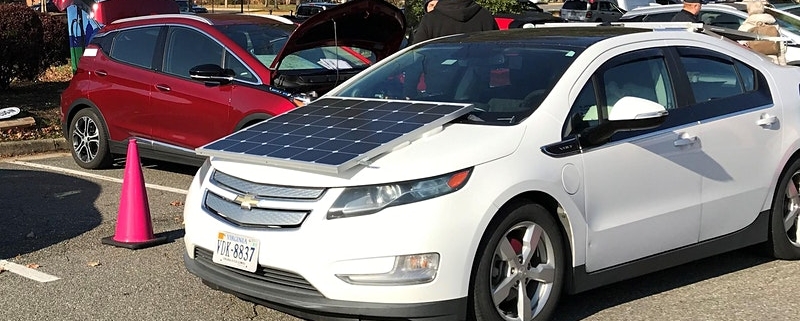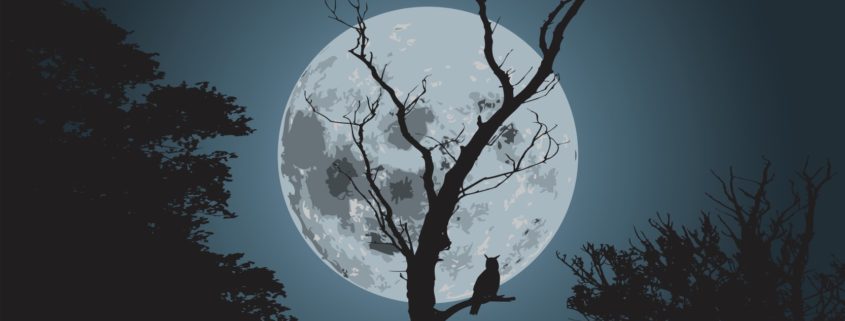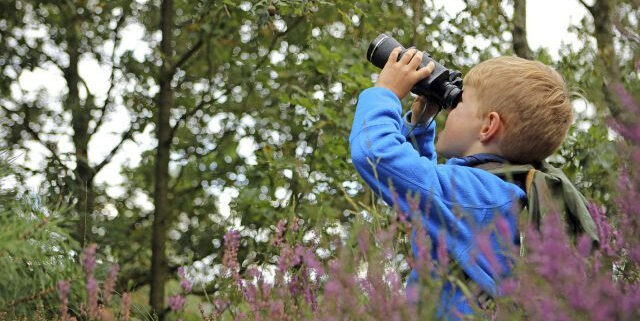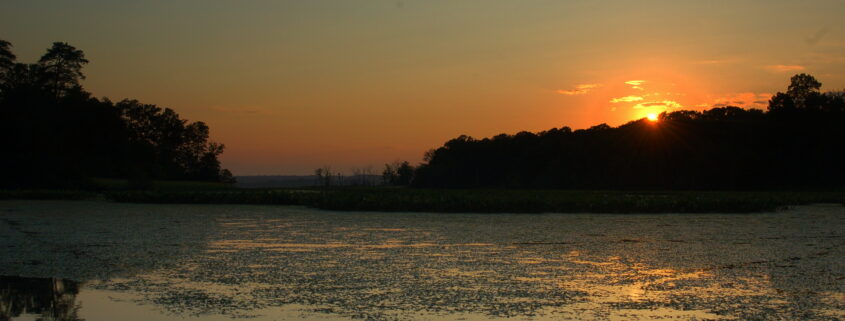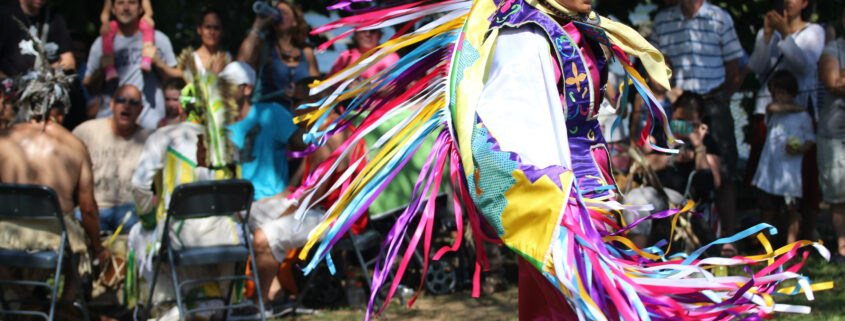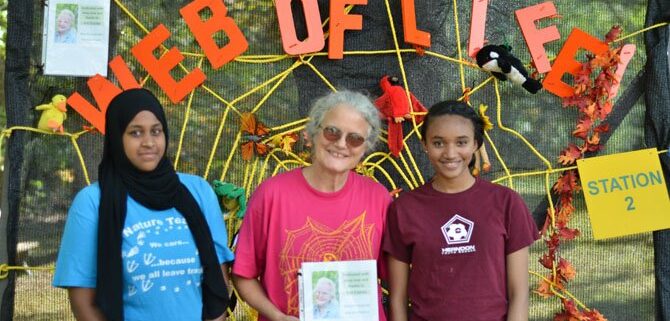Jerry Nissley
That’s the unofficial mantra for the twilight kayak tour at Mason Neck State Park (MNSP). A group departs in time to revel in the golden hour of the setting sun and returns after dark by the moon’s guiding light. The park schedules twilight tours two evenings a month, June through October, to coincide with the full moon, with an additional “evening” tour scheduled once a month that does not necessarily coincide with the full moon. The park offers Saturday morning tours as well. The approved service description for all kayak tours at MNSP is detailed in FMN service category E410.
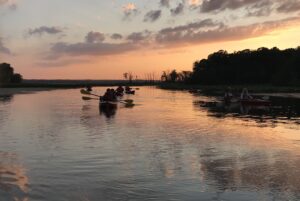
Photo by Jerry Nissley
A typical tour group consists of between 10 to 12 people in kayaks or canoes, which are accompanied by a lead guide and a sweeper. All guides have been skill certified by a qualified Virginia State Park instructor. The objectives of any guided tour at MNSP are to introduce paddlers to the various plants and animals found at the park and to the conservational, historical and cultural significance of the Mason Neck Peninsula (MNP).
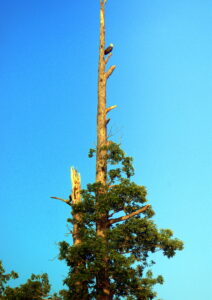
Photo by Jerry Nissley
Guides are trained up in each of the above objective topics prior to leading a tour. The guides may include culture from as early as 1608, when Captain John Smith sailed up the Potomac and encountered the Dogue and the Taux Native Peoples on and around the MNP. Farmers, fishers and hunters, these tribes were part of the Algonquian-speaking Federation and built permanent long house villages along the Potomac River in counties that include Fairfax, Prince George, and Prince William. Records show that Miompse (now Mason Neck) may have been Taux capital known as Tauxenent.
Colonial history includes times that saw the peninsula’s namesake, George Mason and his extended family, take virtual control of the area. George Mason’s home, Gunston Hall (1759) and the remains of his eldest son’s home built on Mason’s Lexington Plantation (1783) are still located on MNP. It is well documented that at one time George Mason’s family operated nearly 25 fish catching/processing facilities on the Potomac from what is now Prince William County, north into waters that are now in Washington, D.C.
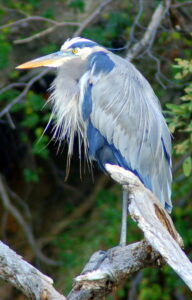
Photo by Jerry Nissley
Equally as important as the culture and history of MNP is understanding why the state park was established and how the natural resources found in and around are preserved. MNSP (est. 1965) and the conjoined Elizabeth Hartwell National Wildlife Refuge (est. 1969) were established for the conservation of the American Bald Eagle and supporting habitat. In 2017, 40 nesting pairs were counted on MNP alone. There is also an active great blue heron rookery with approximately 125 nests near the northern interior of the park. Numerous ospreys may be seen diving for fish each evening and great egrets frequently contrast the falling night with their bright white feathers.
A typical 2.5-hour tour consists of outfitting the paddlers with gear, “kayak 101” instruction, and the round trip tour through Belmont Bay and the adjoining Kane’s Creek. As mentioned, the tour is timed to catch the setting sun and still have enough light so the group can see what the guides are talking about early in the tour. Paddling out we talk history and culture and point out birds such as osprey (Pandion haliaetus), bald eagles (Haliaeetus leucocephalus), great egrets (Ardea alba), great blue herons (Ardea herodias), belted king fishers (Megaceryle alcyon), and red winged black birds (Agelaius phoeniceus) to name a few. Critters, too, like beaver, turtles, raccoons, deer, and snakes, are common.
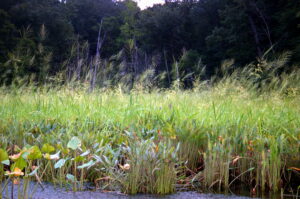
Photo by Jerry Nissley
About mid-tour, we stop to point out several of the aquatic plants that adorn the shore as the calm vail of dusk settles over the marsh. Spatterdock (Nuphar advena), pickerel weed (Pontederia cordata), wild rice (Zizania aquatic), arrow arum (Peltandra virginica), swamp rose-mallow (Hibiscus moscheutos), and cattail (Typha latifolia) are abundant.
Fun facts: Pickerel weed is such an efficient biological filter of polluted water in natural wetlands that it is used in constructed wetlands. Spatterdock has long been used in traditional medicine. Studies show that its root juice may be applied directly for skin for irritations, and the root and seeds may be eaten together for stomach conditions. Native wild rice and cattail were valuable food sources for native peoples. Wild rice found on the Potomac tidal tributaries was boiled and eaten or ground into a powder. The entire cattail plant was used—rhizomes are edible, the long, linear leaves were used for weaving mats and baskets, and the sausage-shaped spike (actually a dense aggregate of female flowers and seeds) was used to kindle fires and to stuff bedding.
Once we enter the far reaches of Kane’s Creek, the quiet solitude of darkness is interrupted only by the chorus of frogs, the flight of dragonflies, and the distant hoot of an owl. We stopped one evening to listen to the grand frog chorus and I literally had to paddle closer to a kayaker to hear the question being asked.
Returning by moonlight is priceless. The herons and egrets have roosted for the night so I try to stay quiet and enjoy the rustling swish of shoreline trees, an occasional deer or raccoon drinking at water’s edge, the splash and churn of spawning snakehead or carp. One time a bass flopped into and out of a kayak as the fish leapt for and missed a flying insect. No worries though—just another cool story for someone to tell at the office on Monday.
The lead guide and sweeper now turn on small safety lights as the group glides back through the evening. The return leg is always the least eventful for me but the most positive. The cool darkness seems to wrap her arms around me and imbue a sense of tranquility within. It encourages inner reflection, a release from the agitation of the six o’clock news and the complexity that daily life may bring on.
As we continue across glass like water of Kane’s Creek, we are bid adieu by the joyful noise of frogs, cicadas, and katydids in three-part harmony no less. Once back, we rack and stack the boats and call it night—and we are all better off somehow for the experience. Each guest is unique so during their night on the water, each guest makes unique connections with Mason Neck and its inhabitants that they will not soon forget.
Background on MNP
Some of the informational material guides use to prepare is supplied by the park but most of the written material I learned from was prepared by fellow VMN and guide, Tom Blackburn. His material encouraged me to do my own follow-on research and learn additional details. Tom has volunteered at MNSP for many years and compiled a wealth of park and habitat information that he readily shares with the 10 or so guides each year. A big thank you goes out to Tom for his continued mentoring.
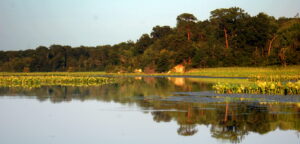
Photo by Jerry Nissley
Two thirds of Mason Neck peninsula, roughly 5000 acres, is protected area managed by four jurisdictions: Virginia State Parks (MNSP), Northern Virginia Regional Park Authority (Pohick Park), U.S. Department of Interior-Bureau of Land Management (Meadowood Special Recreation Management Area), and U.S. Fish and Wildlife Service (Elizabeth Hartwell National Wildlife Refuge) managed as part of the Potomac River National Wildlife Resources Complex.
The Fairfax County peninsula is shaped by Belmont Bay to the south, Potomac River to the east, with Gunston Bay and Pohick Bay bordering the north.
MNSP is a stellar example of the natural and recreational areas maintained by our great state of Virginia. Volunteer opportunities abound at the park and FMN members have indeed been involved in several areas—shore line clean-ups, invasive species removal, Eagle Festival, and of course guides to name a few. MNP consists of unique habitats (woodland and wetland) and was the site of a spring 2019 FMN program field trip. It appears to be a fall 2019 site as well.
Rita Peralta, VMN and senior interpreter at Riverbend Park, was able to share her time with us and presented the wetlands portion in the Elizabeth Hartwell NWR section of the peninsula. The dendrology portion of the field trip was given in the MNSP section and was led by Jim McGlone, Chapter Advisor for the Fairfax Chapter of VMN and an Urban Forest Conservationist with the Virginia Department of Forestry.



